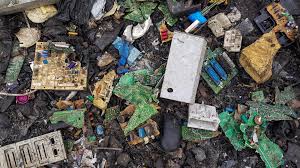World's e-waste "unsustainable", says UN report citing China, India and U.S.
People stuck at home are de-cluttering, and because of the lockdowns there are few workers collecting and recycling the junk, Kees Balde, a senior programme officer with the sustainable cycles programme at the United Nations University, another contributor to the report, told Reuters. NEW CONSUMERS, MORE JUNK What is happening in India and China is symptomatic of a wider problem in developing countries, where demand for goods like washing machines, refrigerators and air conditioners is rising rapidly. "In middle- and low-income countries, the e-waste management infrastructure is not yet fully developed or, in some cases, is entirely absent," the report said.

Across the river from Delhi's Red Fort, the grim neighbourhood of Seelampur lives off what consumers in the modern world throw away - their broken or obsolete electronic and electrical goods.
Home to one of the world's largest markets for e-waste, Seelampur exemplifies the challenge highlighted in a U.N.-led report released on Thursday. The Global E-waste Monitor 2020 report found that the world dumped a record 53.6 million tonnes of e-waste last year. Just 17.4% was recycled.
"Even countries with a formal e-waste management system in place are confronted with relatively low collection and recycling rates," the report said. China, with 10.1 million tonnes, was the biggest contributor to e-waste, and the United States was second with 6.9 million tonnes. India, with 3.2 million tonnes, was third. Together these three countries accounted for nearly 38% of the world's e-waste last year.
While the overall damage done to the environment from all the un-recycled waste may be incalculable, the message from the report was conclusive: "The way in which we produce, consume, and dispose of e-waste is unsustainable." Global warming is just one issue cited by the report as it noted 98 million tonnes of carbon dioxide equivalents were released into the atmosphere as a result of inadequate recycling of "undocumented" refrigerators and air conditioners.
This year's coronavirus lockdowns have exacerbated the e-waste problem. People stuck at home are de-cluttering, and because of the lockdowns there are few workers collecting and recycling the junk, Kees Balde, a senior programme officer with the sustainable cycles programme at the United Nations University, another contributor to the report, told Reuters.
NEW CONSUMERS, MORE JUNK What is happening in India and China is symptomatic of a wider problem in developing countries, where demand for goods like washing machines, refrigerators and air conditioners is rising rapidly.
"In middle- and low-income countries, the e-waste management infrastructure is not yet fully developed or, in some cases, is entirely absent," the report said. Dinesh Raj Bandela, deputy programme manager at the Centre for Science and Environment, a New Delhi-based research and advocacy body, said India's focus on e-waste had to go beyond collection, and manufacturers should be encouraged to produce consumer goods that last longer and are less toxic.
Although India is the only country in South Asia to draft legislation for e-waste, its collection remains rudimentary. In Seelampur, the maze of filthy lanes are filled with scrap shops where thousands of people work, picking apart whatever is salvageable from the junk gathered from across north India.
Outside each shop there are piles of old monitor screens, desktop computers, broken landline telephones, mobile handsets, televisions, voltage stabilisers, air-cons, refrigerators, microwaves, vacuum cleaners and washing machines. Vines of old electric cable are strewn or rolled over the mountains of electronic trash.
Shopkeepers and workers are extremely suspicious of any outsider walking through the narrow lanes, especially journalists. Mohammed Abid, a scrap e-waste dealer, who was willing to speak, denied that ways of handling e-waste in Seelampur broke any laws or posed any dangers. “There are certain jobs that create a lot of problem for the environment, but in this market no such work is done that affects the environment or increases the pollution – nothing of that sort is done here,” he said, while the stench from a nearby open drain filled the air.
(This story has not been edited by Devdiscourse staff and is auto-generated from a syndicated feed.)










